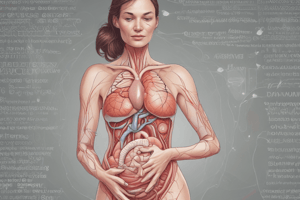Podcast
Questions and Answers
What is the typical increase in red blood cells (RBCs) by term during pregnancy?
What is the typical increase in red blood cells (RBCs) by term during pregnancy?
- 20% (correct)
- 40%
- 10%
- 30%
How much blood loss is estimated during a vaginal delivery?
How much blood loss is estimated during a vaginal delivery?
- 300-500mL (correct)
- 900-1000mL
- 600-800mL
- 100-200mL
Which position should be avoided during neuraxial anesthesia in the 2nd and 3rd trimester due to aortic compression concerns?
Which position should be avoided during neuraxial anesthesia in the 2nd and 3rd trimester due to aortic compression concerns?
- Prone position
- Left lateral position
- Right lateral position
- Supine position (correct)
What percentage of patients may experience aortoiliac artery compression during pregnancy?
What percentage of patients may experience aortoiliac artery compression during pregnancy?
Which of the following is a common effect of inferior vena cava compression during pregnancy?
Which of the following is a common effect of inferior vena cava compression during pregnancy?
What physiological change in the respiratory system is attributed to increased estrogen, progesterone, and relaxin during pregnancy?
What physiological change in the respiratory system is attributed to increased estrogen, progesterone, and relaxin during pregnancy?
What is the primary effect of increased progesterone on systemic vascular resistance (SVR)?
What is the primary effect of increased progesterone on systemic vascular resistance (SVR)?
Which blood vessel experiences dilation due to increased relaxin effects during pregnancy?
Which blood vessel experiences dilation due to increased relaxin effects during pregnancy?
When does cardiac output (CO) decrease to pre-labor levels postpartum?
When does cardiac output (CO) decrease to pre-labor levels postpartum?
What is the main reason for the increased cardiac output during labor?
What is the main reason for the increased cardiac output during labor?
How does a twin gestation impact the cardiovascular changes seen during pregnancy?
How does a twin gestation impact the cardiovascular changes seen during pregnancy?
What effect does increased renin activity have on sodium and water retention during pregnancy?
What effect does increased renin activity have on sodium and water retention during pregnancy?




